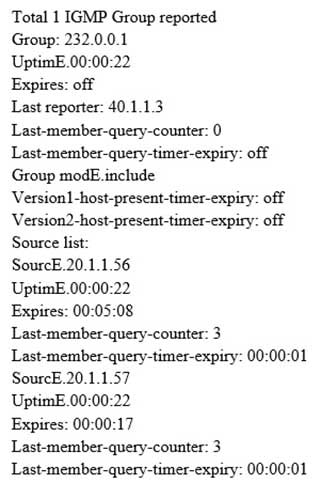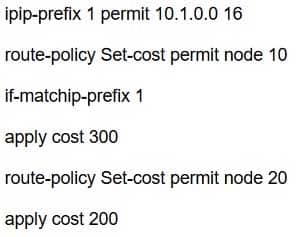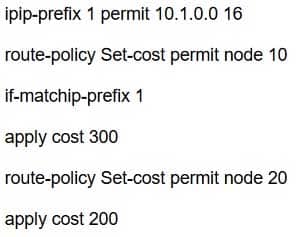H12-224 : HCNP-R&S Fast Track (Huawei Certified Network Professional – Routing & Switching Fast Track) : Part 27
-
Which of the following route selection mechanisms can adopt user-defined policies to determine data forwarding paths flexibly based on ACLs or packet lengths?
- AS-path-filter
- IP-prefix
- Route-policy
- Policy-based-route
-
What are the functions of an IGMPv2 Query message? (Choose three.)
- A router sends IGMPv2 Query messages to collect group memberships of receiver hosts.
- A router sends IGMPv2 Query messages to elect a querier.
- If a router can periodically send IGMPv2 Query messages, it indicates that the router runs properly.
- Based on IGMPv2 Query messages, receiver hosts can obtain the address of a querier and unicast Report messages to the querier.
-
What are the differences between the IGMP versions? (Choose two.)
- IGMPv1/v2 cannot elect queriers but IGMPv3 can.
- In IGMPv2/v3, members can actively leave groups, whereas in IGMPv1 members cannot actively leave groups.
- IGMPv1/v2 do not support the SSM model but IGMPv3 supports.
- IGMPv1/v2 do not support group-specific Query messages but IGMPv3 supports.
-
What is the maximum number of bits that can be used for subnetting, when the network address is a Class C address?
- 6
- 8
- 12
- 14
-
The most remarkable characteristic of OSPF is that it can support the link-state algorithm.
- TRUE
- FALSE
-
Which of the following statements about multicast MAC addresses are true? (Choose three.)
- The high-order 24 bits of a multicast MAC address are 0x01005e and the low-order 23 bits of a multicast MAC address are the same as the low-order 23 bits of a multicast IP address.
- One multicast MAC address maps 32 IP multicast addresses.
- Multicast MAC addresses are used at the link layer to identify receivers that are in the same multicast group.
- One multicast MAC address maps only one IP multicast address.
-
IGMP interface group report information
Ethernet6/1/1(40.1.1.1):
H12-224 HCNP-R&S Fast Track (Huawei Certified Network Professional – Routing & Switching Fast Track) Part 27 Q07 030 The preceding information shows the entry status of an IGMP interface on Ethernet 6/1/1 on a router.
Assume IGMP sends the group-and-source-specific Query message. Which of the following statements is true?- IGMP respectively sends two messages: The source carried in one of the messages is 20.1.1.56 with the S flag bit not set; the source carried in the other message is 20.1.1.57, with the S flag bit set to 1.
- IGMP respectively sends two messages: The source carried in one of the messages is 20.1.1.56 with the S flag bit set to 1; the source carried in the other message is 20.1.1.57, with the S flag bit not set.
- IGMP sends one message carrying two sources 20.1.1.56 and 20.1.1.57, with the S flag bit set to 1.
- IGMP sends one message carrying two sources 20.1.1.56 and 20.1.1.57, with the S flag bit not set.
-
Which of the following route selection tools can be used in “multiple” routing protocols, be configured with matching conditions, and be composed of if-match and apply clauses?
- AS-path-filter
- IP-prefix
- Route-policy
- Community-filter
-
Which of the following protocols support default route advertisement by using commands? (Choose three.)
- RIP
- OSPF
- BGP
- Static
-
MPLS is a switching standard defined by the IETF. Which of the following devices exist on the MPLS network? (Choose two.)
- LSR
- LER
- Label distribution router
- Label transmit router
-
An ACL is a series of orderly rules composed of permit | deny clauses. Which of the following attributes cannot be used for defining an ACL rule?
- Source address
- Destination address
- Port number
- AS-Path
-
The configurations of the defined route-policy Set-cost are as follows:

H12-224 HCNP-R&S Fast Track (Huawei Certified Network Professional – Routing & Switching Fast Track) Part 27 Q12 031 Which of the following statements is true?
- The route 10.1.0.0/16 matches node 10 and its cost is set to 300.
- The route 10.1.0.0/16 matching node 10 also matches node 20 subsequently and its cost is finally set to 200.
- Costs of all routes will be set to 200.
- All routes that fail to match node 10 will be denied.
-
Divide the network by using VLAN can (). (Choose two.)
- Support more network layer protocols
- Restrict the scope of broadcast domain
- Increase the collision
- Guarantee the security
-
Which statements regarding the PVID on the access interface are true? (Choose three.)
- If a packet without VLAN tag is received, the interface adds a VLAN tag to the packets and sets the VID as the default VLAN ID.
- If a packet with VLAN tag is received, the interface compares the VLAN ID in the tag with the default VLAN ID. If they are the same, the interface forwards the packets; otherwise, the interface discards the packets.
- When the interface sends a packet with a VLAN tag that contains the default VLAN ID, the system removes the VLAN tag of the packet, and then forwards the packet.
- PVID on access interface is set to 1 by default and can’t be changed.
-
Which of the following is the multicast distribution tree maintained by PIM-DM?
- SPT
- CBT
- RPT
- STP
-
Which of the following route entries match IP-Prefix defined below? (Choose two.)
ipip-prefix test index 10 permit 192.168.0.0 16 greater-equal 24 less-equal 28
- 192.168.1.0/24
- 192.10.2.0/24
- 192.168.3.0/25
- 192.168.4.0/30
-
What is the range of VLAN IDs?
- 1~1000
- 0~4095
- 0~4096
- 1~4096
-
What is the function for the command “InterfaceVlan-interface Vlan-ID”?
- Create a VLAN
- Create or enter VLAN interface view
- Configure a VLAN for port
- Configure PVID
-
Which of the following route entries matches ACL 2001 that is defined below?

H12-224 HCNP-R&S Fast Track (Huawei Certified Network Professional – Routing & Switching Fast Track) Part 27 Q19 032 - 1.2.3.0/24,1.2.4.0/24, 1.2.5.0/24, 1.2.6.0/24,1.2.7.0/24,1.2.8.0/24
- 1.0.0.0/8,1.2.0.0/16,1.2.3.0/24,1.2.4.0/24, 1.2.5.0/24, 1.2.6.0/24,1.2.7.0/24,1.2.8.0/24
- 1.2.3.0/24,1.2.5.0/24,1.2.7.0/24
- 1.2.0.0/16,1.2.4.0/24,1.2.6.0/24,1.2.8.0/24
-
The route selection tool route-policy can filter and set BGP attributes based on pre-defined conditions. Therefore, this tool is commonly used to define policies for BGP peers and often used in route generation.
- True
- False
Subscribe
0 Comments
Newest